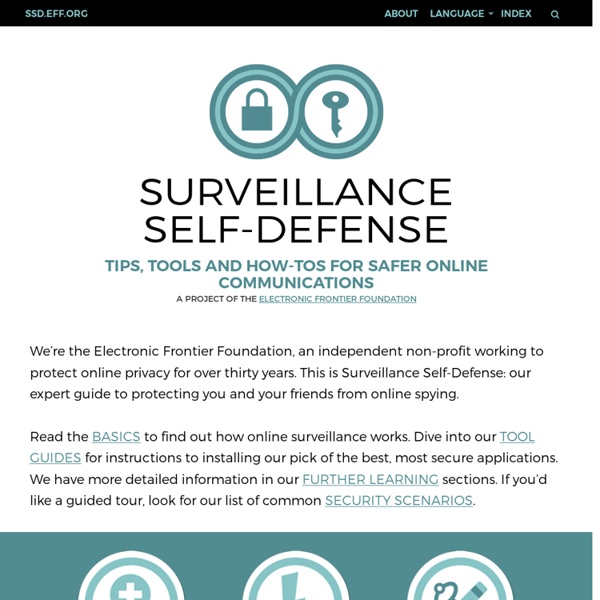



Some Facts About Carrier IQ There has been a rolling scandal about the Carrier IQ software installed by cell phone companies on 150 million phones, mostly within the United States. Subjects of outright disagreement have included the nature of the program, what information it actually collects, and under what circumstances. This post will attempt to explain Carrier IQ's architecture, and why apparently conflicting statements about it are in some instances simultaneously correct. The information in this post has been synthesised from sources including Trevor Eckhart, Ashkan Soltani, Dan Rosenberg, and Carrier IQ itself. First, when people talk about "Carrier IQ," they can be referring to several different things. There is consensus agreement that layers 2–4 collect information that can include location, browsing history (including HTTPS URLs), application use, battery use, and data about the phone's radio activity.
anonabox View Exif data online, remove Exif online Web Browsers Web browsers are software on your machine that communicate with servers or hosts on the Internet. Using a web browser causes data to be stored on your computer and logs to be stored on the web servers you visit, and frequently transmits unencrypted information. Until you have understood the mechanisms by which this occurs — and taken steps to prevent them — it is best to assume that anything you do with a web browser could be recorded by your own machine, by the web servers you're communicating with, or by any adversary that is able to monitor your network connection. Controlling and Limiting the Logs Kept by Your Browser Web browsers often retain a large amount of information about the way they are used. For example, here are the stored data privacy settings pages for Firefox, the free web browser: Apple’s Safari browser also has an easy one-click option to clear everything. Controlling and Limiting the Logs Kept By Web Servers Web Privacy is Hard Cookies Managing Adobe Flash Privacy.
RetroShare Speech Jammer ● I can get HOURS of work done in my house FINALLY because of this incredible noise-blocker. THANK YOU !!! ● My go to tinnitus mask. Noise to some. Heaven to kill the horrific ringing. Thank you so much to everyone. ● A great help! ● This sounds a lot like certain audio hallucinations I get. ● My spouse talks like Brian Blessed on the phone and this noisemachine set to 'animate' is the only thing I've found that can block him out. ● These noises plus some relatively cheap earbuds managed to completely knock out of the speech of a television I was less than 10 feet from. ● This is my favorite noise blocker. ● You would think libraries would be quiet. ● The dead sheet hacker currently infested in my phone for the last 6 months listening 24/7 to my microphone loves this sound and so in turn I love it even more. ● First all I would like say, that this generator and this whole site is ablsolutely NUTS! ● Kill your ears. ● Works good but the sound is harsh. ● I work next to someone very loud.
Hundreds of websites share usernames sans permission High performance access to file storage Home Depot, The Wall Street Journal, Photobucket, and hundreds of other websites share visitor's names, usernames, or other personal information with advertisers or other third parties, often without disclosing the practice in privacy policies, academic researchers said. Sixty-one percent of websites tested by researchers from Stanford Law School's Center for Internet and Society leaked the personal information, sometimes to dozens of third-party partners. The report comes as US officials have proposed a mandatory Do Not Track option for all websites. In the report, Jonathan Mayer, a Stanford graduate student who led the study, argued against the claim that the online tracking is anonymous. “We believe there is now overwhelming evidence that third-party web tracking is not anonymous,” he wrote. The report cited privacy policies of many of the websites that appeared to make no mention of the practice.
The internet is our social network | friendica Bitcoinprivacy.guide A beginners guide to Bitcoin privacy Home Intro We won’t beat around the bush. Bitcoin privacy is not easy, especially for newcomers. Bitcoin privacy is a spectrum that is constantly shifting with different protocol changes, wallet or node features, and regulatory frameworks. Let’s get started! Table of Contents Pull requests and suggestions are welcomed By Bitcoin Q+A | Support | More resources
Tracking the Trackers: Where Everybody Knows Your Username Click the local Home Depot ad and your email address gets handed to a dozen companies monitoring you. Your web browsing, past, present, and future, is now associated with your identity. Swap photos with friends on Photobucket and clue a couple dozen more into your username. Keep tabs on your favorite teams with Bleacher Report and you pass your full name to a dozen again. [Update 10/11: Since several readers have asked – this study was funded exclusively by Stanford University and research grants to the Stanford Security Lab. Background on Third-Party Web Tracking and Anonymity In a post on the Stanford CIS blog two months ago, Arvind Narayanan explained how third-party web tracking is not at all anonymous. In the language of computer science, clickstreams – browsing histories that companies collect – are not anonymous at all; rather, they are pseudonymous. Arvind noted five ways in which a user's identity may be associated with third-party web tracking data. Web Information Leakage
The Freenet Project - /index Image Scrubber Save Image 💾 Rotate Image ⤾ Brush Size Blur Radius Image Scrubber This is a tool for anonymizing photographs taken at protests.